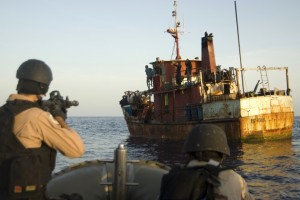Piracy in Sub-Saharan Africa Needs to Addressed on Land
Given the tremendous social and political conflict occurring in many piracy prone countries in Sub-Saharan Africa, counter-piracy efforts at sea will likely fail, as indicated in a recent research paper of the Office of Naval Research in the United States on the trends in maritime piracy.
Extant research shows state fragility, economic deprivation, population, and geographic opportunity are all related to the incidence of piracy in territorial waters. Similar to the growth of armed insurgencies, political and economic conditions help facilitate corruption and criminality, both of which enable piracy, Brandon C. Prins, Professor of Political Science at the University of Tennessee, notes in the research.
The average fragility score for the nine Sub-Saharan countries examined in the report (averaged across the 2009-2013 time period) is 16.8, which is 2.5 times higher than countries without piracy.
The average fragility score for countries without piracy during the 2009-2013 time period is 6.6. Somalia, with an average score of 24, represents the closest thing to a failed state in the international system. The political improvement Somalia witnessed from 2011 to 2012 (and likely into 2013 although the data for 2013 are not yet available) appears to have helped counter-piracy efforts in the Greater Gulf of Aden.
Given that trade in the greater Gulf of Aden is valued at nearly one trillion US dollars a year, it is clear why would-be pirates gravitate toward these waters. Further, Somalia despite having only five deep-sea ports, sits only five kilometers from where the Red Sea empties into the Gulf of Aden, and approximately twenty thousand ships transit through the Greater Gulf of Aden each year. These vessels represent in many cases easy targets for would-be pirates.
Economic deprivation within countries also helps to facilitate piracy and illegal markets more generally. Unemployed youth (especially males) provide the foot soldiers both for insurgencies and pirate gangs.
Some of the most piracy-prone countries remain some of the poorest places on Earth. Somalia had an average per capita GDP in 2009-2013 of only $562. Nigeria was slightly higher at $1,013.
Convincing individual fishers or farmers to forego the opportunity of a lucrative payoff (typically several thousand US dollars) remains difficult when there are few employment alternatives. And, monies from pirate operations tend to depress job growth in the legal economy.
The research shows that efforts to increase wages and job growth in piracy-prone countries must be part of an effective counter-piracy strategy.
Although pirate attacks dropped dramatically off the coast of Somalia in 2013, they increased significantly in the Gulf of Guinea. Counter-piracy naval operations and improved security onboard ships likely contributed to the decline in the greater Gulf of Aden.
Some strengthening in Somali governing institutions also likely had an effect even as armed conflict continued to create difficulties for the new regime. In the Gulf of Guinea, a deteriorating security environment and continued fragility in many West African governments provided space for pirate groups to operate.

